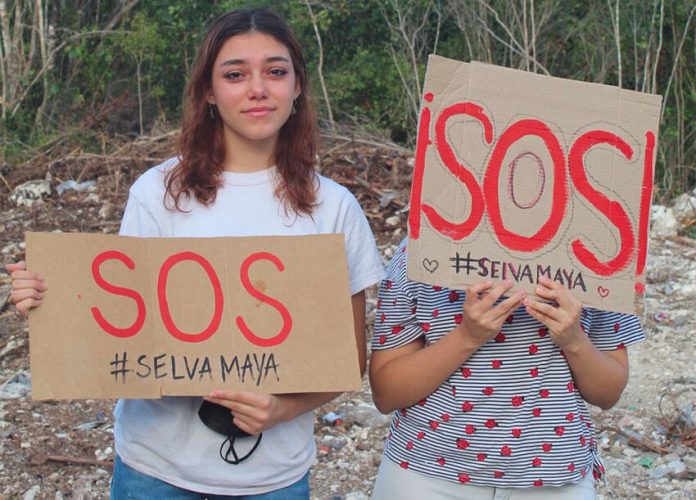Dozens of famous Mexicans as well as environmental activists and others have joined a new campaign against the federal government’s Maya Train project, warning that construction of the railroad in Quintana Roo threatens jungle, subterranean rivers and wildlife.
The social media campaign – which specifically warns of the dangers of construction of section 5 of the railroad between Cancún and Tulum – was launched Tuesday (World Water Day) under the name and hashtag #SelvameDelTren, a play on words in which the Spanish word for jungle is used in place of the Spanish word for save.
Thus, through the use of an inventive double entendre, “save me from the train” becomes “save the jungle from the train” or “save me and the jungle from the train.”
In one of several campaign videos featuring prominent Mexicans, actor and comedian Eugenio Derbez declares that the Maya Train is “destroying the jungle,” which he describes as “our natural heritage.”
The federal government announced in January that the route for section 5 of the railroad would be moved inland after the Playa del Carmen business community complained that the construction of the railroad parallel to Highway 307 would effectively divide the city in two.
Virgin jungle has already been cleared to make way for tracks along the modified route.
“Hundreds, thousands of trees have already been cut down and it could be millions more,” says singer Natalia Lafourcade in the aforesaid Sélvame del Tren video.
“The subterranean rivers and cenotes [natural sinkholes] are being contaminated and it’s worth mentioning that the longest system of subterranean rivers on planet Earth is in that area,” says Arturo Islas, a television host, actor and environmentalist.
In a second appearance, Lafourcade asserts that “thousands of native species” are losing their habitat due to construction of the railroad, while Rubén Albarrán, singer of the acclaimed rock band Café Tacvba, declares that he and others who have joined the campaign are not the government’s “adversaries” but rather Mexicans who “want life for all of us.”
“We don’t need a train that hasn’t been evaluated environmentally and doesn’t comply with the law,” says Maya woman Imelda Kimil.
Roberto Rojo, a biologist and speleologist, advises President López Obrador that there is no hurry to complete the project, which is slated for completion in 2023.
A video that is part of a new campaign in protest against the Maya Train.Queremos que el #TrenMaya respete la naturaleza. 🍃
Hoy alzamos la voz. No al tramo 5, sí a los ríos, selva y cenotes. 🌳🐆💧#SélvameDelTren #SalvemosElAgua #SalvemosLaVida
firma la petición aquí. ⤵️https://t.co/eNBWum7FFK pic.twitter.com/8hzgeUjQb2— Sélvame del Tren (@selvamedeltren) March 22, 2022
“Section 5 will pass over subterranean rivers, caves and cenotes, a unique ecosystem and the longest in the world,” he says.
Albarrán invites López Obrador – who recently flew over a section of the modified route – to “tour the area and listen to the experts,” adding that “we don’t need a train – we need to conserve our territory.”
“And we want to stop the damage to the [Yucatán] Peninsula,” adds Islas. “If not today, when will we do it? The Riviera Maya is crying out to us.”
Actor Bárbara Mori concludes the video by calling for all citizens to come together for Mexico. “Let’s save the jungle, let’s save the water,” she says.
Among the other well-known Mexicans who lent their voices to the campaign in other videos are Kate del Castillo, Omar Chaparro, Saúl Hernández and Ana Claudia Talancón.
“We’re against the Maya Train having to pass precisely through a protected area,” says Hernández, singer of the band Caifanes.
A change.org petition against the modified route of rail project had attracted signatures from more than 90,000 people by Wednesday morning.
President López Obrador responded to the campaign at his press conference Wednesday morning, claiming that its supporters had been contracted by his opponents to criticize and discredit the government.
The opposition “convinces or contracts with artists and pseudoenvironmentalists who are supposedly worried about defending the environment …”
The new social media campaign, which is running on Twitter, Facebook and Instagram, adds to opposition to the Maya Train in Quintana Roo as well as broader resistance to the US $8 billion project, which will also run through Tabasco, Campeche, Yucatán and Chiapas.
One of the opponents is Centinelas del Agua, a non-profit organization focused on the protection of water resources on the Yucatán Peninsula.
“The nation’s budget is being spent on a project that doesn’t make financial sense, which is a threat to ecosystems, which will contaminate drinking water and which will affect Mexicans’ natural and tourism heritage,” said Otto Van Bertrab, the organization’s founder.
Raúl Padilla, president of the Quintana Roo-based Jaguar Wildlife Center, called on López Obrador to visit the region’s caves and cenotes, and inspect the work being done to monitor and protect wildlife.
Jaguars are one species that experts say will be adversely affected by the construction and operation of the 1,500-kilometer railroad.
The Maya Train, one of the federal government’s signature infrastructure projects, has also encountered resistance from Mayan communities, some of which have taken legal action against its construction.
Mayan residents of the states through which the train will run have complained about not being properly consulted about the project, which is slated to begin operations in late 2023, although a federal court recently suspended environmental permits for three sections.
In 2019, the Mexico office of the United Nations High Commissioner for Human Rights raised a range of concerns about the consultation process prior to a vote on the project, among which was that translations of information into indigenous languages were inadequate, if they existed at all.
With reports from El Universal and Reforma
